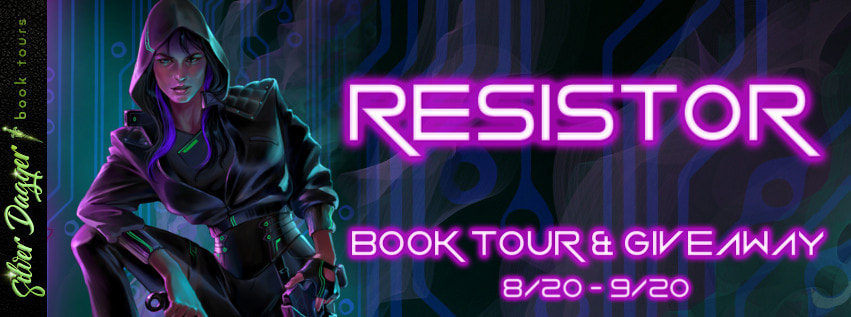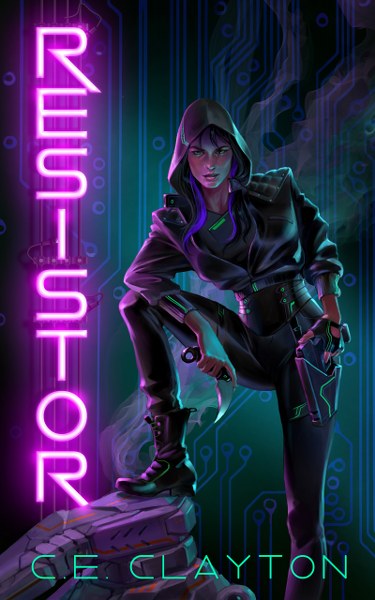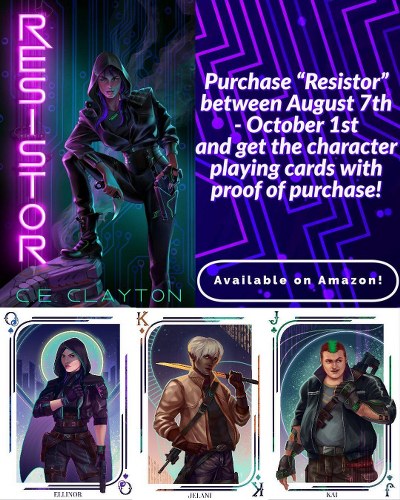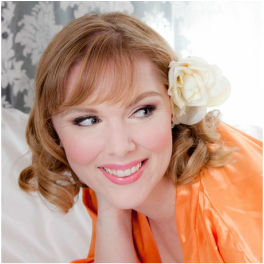Resistor:
An Eerden Novel
Ellinor
Book 1
by
C.E. Clayton
Genre:
New Adult Cyberpunk Fantasy
Ellinor Rask has wanted
one thing for the past eight years: vengeance. But when Ellinor is
captured, she finds herself dragged back into the world she walked
away from, entangled once more with friends she would rather forget.
As if that weren’t
humiliating enough, Ellinor learns first hand that her magic can be
stripped away by a piece of bio-tech—and her ex-boss is happy to
leash her with the technology in order to get what he wants. If
Ellinor behaves, the device will be removed. All she has to do is
deliver a package. One containing a creature created from raw magical
energy and discarded technology. Simple, right?
But when her goals
start getting people murdered, Ellinor has to decide if the year’s
planning, her honor, and even her own magic, are worth the lives it’s
costing. Dodging ruthless gangsters, she finds herself on the run
with a creature of immeasurable magical abilities alongside her
one-time friends. Now, Ellinor must relearn to trust the people she
once abandoned. She must put her faith in technology, and her life in
the hands of independent contractors, all while racing to deliver the
package before it gets taken by force, or worse, the creature decides
to make an appearance itself.
If
you purchase either a physical copy, or pre-order the digital copy,
you will receive the three, custom character playing cards once you
show proof of purchase! It doesn't matter what country you're in
either, I will absolutely send you these beauties by the phenomenal
Golden Rose!
But
if users purchase signed copies directly from me, they will get the
character art of Ellinor in chains by Arz,
a bookmark by Dominique
Wesson,
in addition to the playing cards if purchased during the pre-order
window.
Send
proof of purchase to authorcontact@ceclayton.com
What are common traps for aspiring writers?
I feel like a lot of aspiring writers get too scared to write sometimes because you read all this “advice” about don’t use dialogue tags, don’t use said, never use adverbs, write what you know, you have to plot your whole book before starting that it can be paralyzing. It’s an easy trap to fall into where you get over inundated with these arbitrary rules where you don’t either start, or finish a project because all these other people have already claimed you’re doing it wrong. Don’t fall into that trap! These “rules” for writing are often just people’s preferences for how they like to write or the books they like to read and shouldn’t dictate how YOU want to write your story. Use the words you want and string them together the way you most love, then worry about the grammar or how it reads to others once you’re done, not before you’re finished with that first rough draft.
Do you try more to be original or to deliver to readers what they want?
I don’t really write to market, so I guess you can say I try to be more original then delivering something that readers may want because certain genre types or characters are trending. I write the kind of stories I find fun, and if that happens to be trending, then awesome! But it’s not really something I think about when I first start crafting my books.
How long on average does it take you to write a book?
I’m a pretty fast writer so I have been able to write an over 100k word novel in about 5 months. But I can only do that if I know the story ahead of time, I’ve plotted out some major events, outlined a few chapters, built out my characters… Writing is the fast part for me personally, it’s all the work before I start writing the story, and all the editing and revisions I do after I finish that first draft that take the longest. That’s why it takes me about 1-2 years to actually finish writing the book!
Do you believe in writer’s block?
Writers block is real, at least it is for me and how I view it. Writers block can come in many forms with either just not knowing how to move a story along, or feeling uninspired. I’ve experienced both and I’ve learned to interpret what each of those blocks means for me personally, and how to deal with them so that the “block” doesn’t last for more than a day or some.
Usually if I’m blocked because I just don’t know what to write or how to move the scene forward, it’s because, subconsciously, there’s a hole in my story that my brain has latched on to and won’t move off from. When that happens, I go back over my notes, which is basically a bullet outline of some of the major things that need to get accomplished, and then go back anywhere from 2 to 10 chapters of my current work in progress and start “editing”. I say editing, but it’s more of reading and seeing where 1. That plot hole or problem area is that I can fix and then move on from or 2. Get my head back into my characters headspace and the book itself. This can typically happen if I haven’t been writing in a while, or had to take a break from writing for say, a vacation.
When I don’t feel inspired to write though, that’s usually a sign that my creative tank is low. I’ve probably just finished a project, or been working really hard on blog posts or marketing, or the business side of writing and have inadvertently burnt myself out creatively. This always hits me very hard after I’ve finished a project, but am attempting to start the next book. What helps me most with this is allowing myself to either read books I’ve been neglecting or putting off, watching a movie I love, or watching really interesting TV series. Basically, immersing myself in amazing creative content to help inspire me again while also giving my mind a chance to recharge. Sometimes just doing something else creative that isn’t writing related—like coloring books or gardening—is enough to break the inspiration based writers block, as well.
I really love what V.E Schwab said about writing too. Some days are days where you can write 10k words like no ones business, but other days are thinking days, research days, refueling days, and those are just as much a “writing day” as the ones where you put new words on the page.
I feel like a lot of aspiring writers get too scared to write sometimes because you read all this “advice” about don’t use dialogue tags, don’t use said, never use adverbs, write what you know, you have to plot your whole book before starting that it can be paralyzing. It’s an easy trap to fall into where you get over inundated with these arbitrary rules where you don’t either start, or finish a project because all these other people have already claimed you’re doing it wrong. Don’t fall into that trap! These “rules” for writing are often just people’s preferences for how they like to write or the books they like to read and shouldn’t dictate how YOU want to write your story. Use the words you want and string them together the way you most love, then worry about the grammar or how it reads to others once you’re done, not before you’re finished with that first rough draft.
Do you try more to be original or to deliver to readers what they want?
I don’t really write to market, so I guess you can say I try to be more original then delivering something that readers may want because certain genre types or characters are trending. I write the kind of stories I find fun, and if that happens to be trending, then awesome! But it’s not really something I think about when I first start crafting my books.
How long on average does it take you to write a book?
I’m a pretty fast writer so I have been able to write an over 100k word novel in about 5 months. But I can only do that if I know the story ahead of time, I’ve plotted out some major events, outlined a few chapters, built out my characters… Writing is the fast part for me personally, it’s all the work before I start writing the story, and all the editing and revisions I do after I finish that first draft that take the longest. That’s why it takes me about 1-2 years to actually finish writing the book!
Do you believe in writer’s block?
Writers block is real, at least it is for me and how I view it. Writers block can come in many forms with either just not knowing how to move a story along, or feeling uninspired. I’ve experienced both and I’ve learned to interpret what each of those blocks means for me personally, and how to deal with them so that the “block” doesn’t last for more than a day or some.
Usually if I’m blocked because I just don’t know what to write or how to move the scene forward, it’s because, subconsciously, there’s a hole in my story that my brain has latched on to and won’t move off from. When that happens, I go back over my notes, which is basically a bullet outline of some of the major things that need to get accomplished, and then go back anywhere from 2 to 10 chapters of my current work in progress and start “editing”. I say editing, but it’s more of reading and seeing where 1. That plot hole or problem area is that I can fix and then move on from or 2. Get my head back into my characters headspace and the book itself. This can typically happen if I haven’t been writing in a while, or had to take a break from writing for say, a vacation.
When I don’t feel inspired to write though, that’s usually a sign that my creative tank is low. I’ve probably just finished a project, or been working really hard on blog posts or marketing, or the business side of writing and have inadvertently burnt myself out creatively. This always hits me very hard after I’ve finished a project, but am attempting to start the next book. What helps me most with this is allowing myself to either read books I’ve been neglecting or putting off, watching a movie I love, or watching really interesting TV series. Basically, immersing myself in amazing creative content to help inspire me again while also giving my mind a chance to recharge. Sometimes just doing something else creative that isn’t writing related—like coloring books or gardening—is enough to break the inspiration based writers block, as well.
I really love what V.E Schwab said about writing too. Some days are days where you can write 10k words like no ones business, but other days are thinking days, research days, refueling days, and those are just as much a “writing day” as the ones where you put new words on the page.
C.
E. Clayton was born and raised in the greater Los Angeles area. After
going the traditional career route and becoming restless, she went
back to her first love--writing--and hasn't stopped. She is the
author of young adult fantasy series, "The Monster of Selkirk",
the creator of the cyberpunk Eerden Novels, and her horror short
stories have appeared in anthologies across the country. When she's
not writing you can find her treating her fur-babies like humans,
constantly drinking tea, and trying to convince her husband to go to
more concerts. And reading. She does read quite a bit.
#PreOrder Tour with Guest Post & #Giveaway
#Resistor #eerden #cyberpunk #fantasy #newadult #ceclayton









I like the cover
ReplyDelete